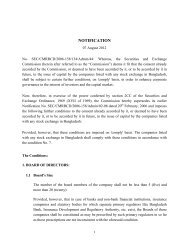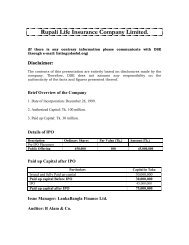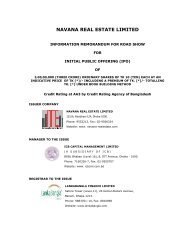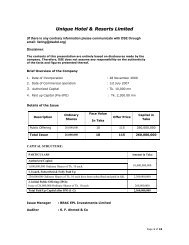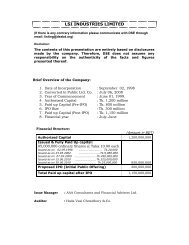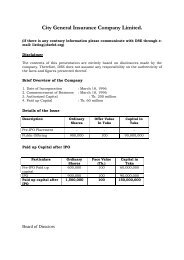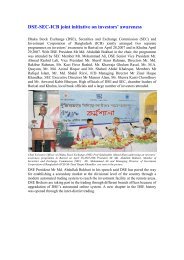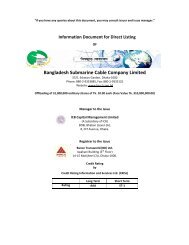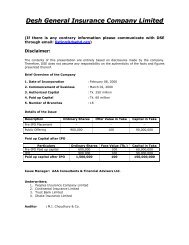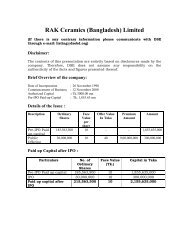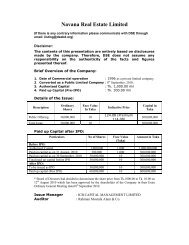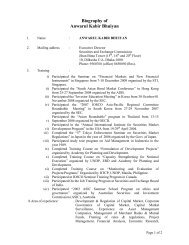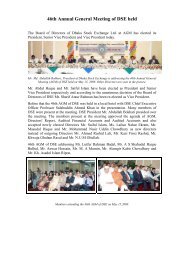Information Document - Dhaka Stock Exchange
Information Document - Dhaka Stock Exchange
Information Document - Dhaka Stock Exchange
- No tags were found...
Create successful ePaper yourself
Turn your PDF publications into a flip-book with our unique Google optimized e-Paper software.
CREDIT RATING REPORTONKHULNA POWER COMPANY LTD.Two part tariff i.e.Fuel Tariff & OtherMonthly TariffOMTs were quoted for 15 years at 50%, 60%, 70%, and 80% plant factors, and together withFT, account for the payment to the Company for electricity produced on a per Kwh basis. Atplant factors above 80%, the OMT used will be the same as that quoted for an 80% plantfactor.5.0 INDUSTRY OVERVIEWThe Ministry of Power, Energy, and Mineral Resources (MEMR) monitors the overall powersector of the country through the Power Division and Power Cell. Generation and distributionactivities have been opened to foreign and private sector, although both the sectors remaindominated by state-owned entities. Given the poor state-run electricity infrastructure, thegovernment issued the "Private Sector Power Generation Policy of Bangladesh" in 1996 andbegan to invited proposals from Independent Power Producers (IPPs) in the private sector inorder to ease the country’s electricity supply shortage. In response, several IPPs were set upafter 1996. The Private Sector Power Generation Policy of 1996 (Amended a few clause inSeptember 11, 2001) offers attractive incentive packages to IPPs including exemption fromincome tax for 15 years. However, the private power producers are still in hesitation due tothe tariff policy regarding gas supply and power sale etc. Recent move of the Government toincrease the tariff rate of gas supply is a major concern to the private power producers. Sideby side with the large IPP projects, the Government also adopted a policy of "Small PowerGeneration Policy," which encourages development of small local generation projects of up to10-MW in capacity in underserved areas. The country has an active rural electrificationprogram, which is supported by the ADB’s Power Sector Development Program (PSDP)initiated in 2003.Since natural gas dominates our power sector in Bangladesh, 95% of electricity comes fromconventional thermal power (primarily natural gas) and the remaining 5 percent throughhydroelectric power. In January 2006, Bangladesh’s first coal-fired power plant begancommercial production at the 250-MW Barapukuria facility in Parbotipur.According to Power Cell, the Bangladesh Power Development Board (BPDB) generated 3400MW of the country’s 5245 MW of total commercial electricity, or about 64% percent of thetotal installed capacity. Over the last several years although the demand of power and gasgrew in geometric progression, yet the power sector did not grow as per requirement and gassector failed to explore its resources and developed its reserve. In the last one and half year’snatural gas production, transmission and supply situation has deteriorated. PDB viewed that,for gas supply shortage alone, it failed to generate about 850MW and for maintenance andoverhauling of plants another 323 MW power could not be generated.Per capita Electricity in Bangladesh is one of the lowest in the world, at about 169.69 kilowatthours(kwh) in 2006. At present only 42.09% percent of the population has access toelectricity, primarily in the more developed eastern zone of the country. Since much of thecountry is disconnected from the national electricity grid, noncommercial sources of energysuch as biomass are estimated to represent more than half of Bangladesh’s energyconsumption.6.0 CORPORATE GOVERNANCE14- Member BoardPage 4 of 156.1 Board of DirectorsThe Board of KPCL consists of fourteen directors. Mr. Muhammed Aziz Khan, nominated fromSummit, is the Chairman of the company. Mr. Aziz Khan is a renowned and pioneer businesspersonality in private power sector of Bangladesh. After completion of MBA from Institute ofBusiness Administration of <strong>Dhaka</strong> University in 1980, he sponsored the Summit Group. He isalso the chairman of Summit Power Limited; the first company in the private sector to gopublic. Mr. Hasan Mahmood Raja nominated from United acts as Managing Director of thecompany. The Board members have sound exposures in the operation and technical aspect ofthe business, since they are involved in diversified business for a long.



